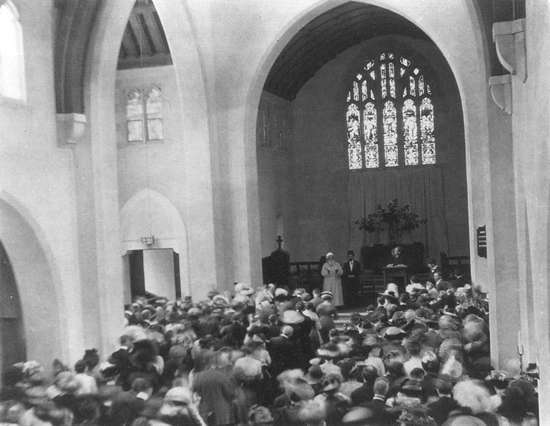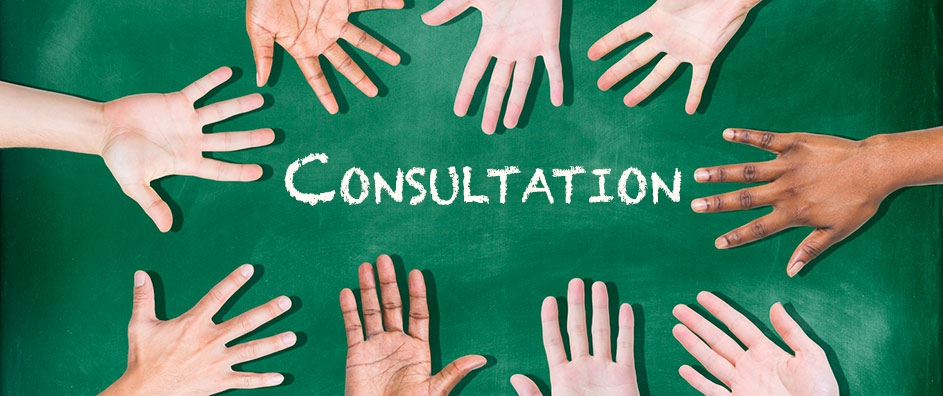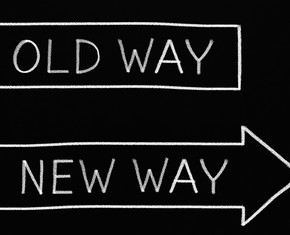The views expressed in our content reflect individual perspectives and do not represent the authoritative views of the Baha'i Faith.
In April 1912 in Chicago, Abdu’l-Baha, the son of Baha’u’llah, the founder of the Baha’i Faith, shared a prayer for the United States. In it he prayed “O God, let this American democracy become glorious in spiritual degrees just as it has aspired to material degrees.” On another occasion he spoke in New York of “the banner of spiritual democracy” being “hoisted aloft.”
So what does Abdu’l-Baha mean when he joins the words spiritual and democracy?

Abdu’l-Baha in Chicago
Abdu’l-Baha did not come to North America to talk about politics. Nonetheless, important clues in the Baha’i teachings illustrate the prospect of spiritual democracy. It isn’t necessarily some new form of government—but it does refer to patterns of thought and behavior Baha’is see as essential for a well-governed society. One of the most important of these is consultation.
As any of us become acquainted with the Baha’i Faith, we learn that consultation has a very important role in its teachings. Baha’i consultation doesn’t just refer to seeking out the opinions of others—instead, it implies a broader approach to social life itself, in which two or more people cooperate in the expansion of understanding and the making of decisions.
In the Baha’i concept of consultation, people come together in a spirit of fellowship to share perspectives and to try and form a common point of view. As they explore reality together, a new path often opens before them. Consultation brings about a decision that might have been impossible for any one of us to make on our own. But the result is not a compromise, not just a tolerable meeting point between multiple opposing points of view. Instead it represents the single best outcome, with its own cohesive wisdom justifying it, that the group can arrive at when it consults together in good faith. In the Baha’i understanding, consultation is a cooperative struggle, not a competitive struggle. Its aim is the unity of truth, not the unity of opinions—the key difference between modern representative democracy and consultation as practiced by Baha’is.
If you’ve had much experience being active in public life, you’ll quickly detect that agreement and truth are hard enough to come by on their own. To have both agreement and truth has the scent of unattainable utopia. They stand together easily enough in the realm of abstract ideas. In practice, though, we usually have to choose between one or the other. If these two things ever fuse together in reality, they must pass through a long storm of contradiction; for example, universally-believed falsehoods, bogus theories serving the dominance of the powerful, the war of mutually incompatible dogmas, and everything in between.
But in true consultation, with great effort, a better path gradually opens.
With that consultative ideal in mind, Abdu’l-Baha was disappointed with some of the practices of existing democracies during his travels in Europe and North America. While travelling in France he had the opportunity to witness a session of the French Senate. In his reflections on those memories he explains what is meant by true consultation:
In this Cause consultation is of vital importance, but spiritual conference and not the mere voicing of personal views is intended. In France I was present at a session of the senate, but the experience was not impressive. Parliamentary procedure should have for its object the attainment of the light of truth upon questions presented and not furnish a battleground for opposition and self-opinion. Antagonism and contradiction are unfortunate and always destructive to truth. In the parliamentary meeting mentioned, altercation and useless quibbling were frequent; the result, mostly confusion and turmoil; even in one instance a physical encounter took place between two members. It was not consultation but comedy. – Abdu’l-Baha, The Promulgation of Universal Peace, p. 72.
Abdu’l-Baha then goes on to express how different points of view should encounter each other in consultation. He weaves listening, thinking, and speaking with others into a spiritual discipline of peaceful truth-seeking. In short, the effective participation of other people enhances rather than detracts from the pursuit of truth, and the gradual emergence of the truth generates agreement:
…consultation must have for its object the investigation of truth. He who expresses an opinion should not voice it as correct and right but set it forth as a contribution to the consensus of opinion, for the light of reality becomes apparent when two opinions coincide. A spark is produced when flint and steel come together. Man should weigh his opinions with the utmost serenity, calmness and composure. Before expressing his own views he should carefully consider the views already advanced by others. If he finds that a previously expressed opinion is more true and worthy, he should accept it immediately and not willfully hold to an opinion of his own. By this excellent method he endeavors to arrive at unity and truth. Opposition and division are deplorable… Therefore, true consultation is spiritual conference in the attitude and atmosphere of love. Members must love each other in the spirit of fellowship in order that good results may be forthcoming. Love and fellowship are the foundation. – Ibid., pp.72-73.
When this approach is ignored, the group must typically choose between agreement and truth. They will arrive at agreement but not truth, if not enough people accept the truth in other people’s statements. But that agreement will be fragile and short-lived if it goes against some participants’ intellectual conscience. And they may arrive at the truth but not agreement, or at least someone’s perspective on the truth, if enough people take a gamble that they’re in the right and are justified in overpowering everyone else. Such an action will not benefit from what is true and worthy in the views of the marginalized faction, and may soon be disrupted by the unfolding of reality.
In light of these problems Abdu’l Baha presents true consultation as: “spiritual conference in the attitude and atmosphere of love.” With true consultation, the group can move towards both agreement and truth. They can approach that condition the French Senate of the time so sorely lacked. Perhaps these reflections shed light on what Abdu’l-Baha might have meant when he spoke of spiritual democracy.
Next: The Prospects for Building a Spiritual Democracy
















Comments
Sign in or create an account
Continue with Googleor